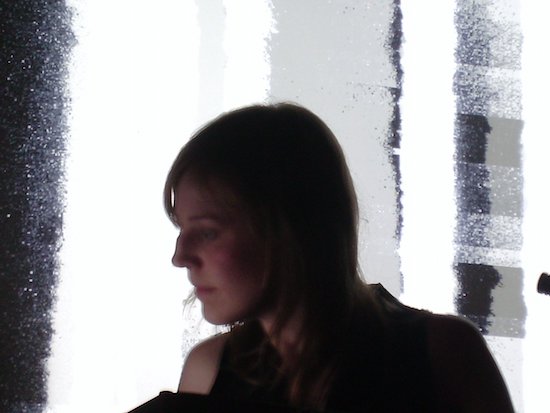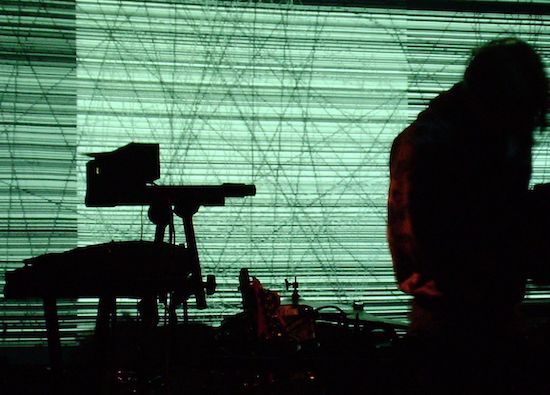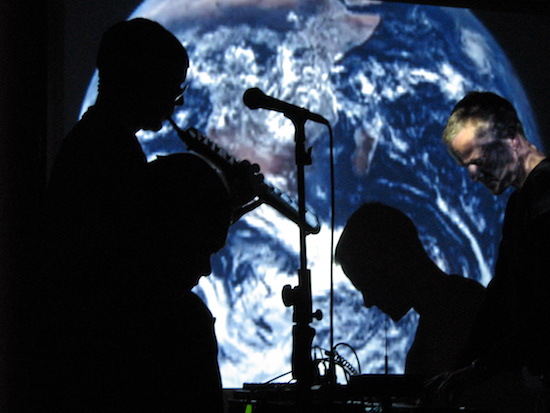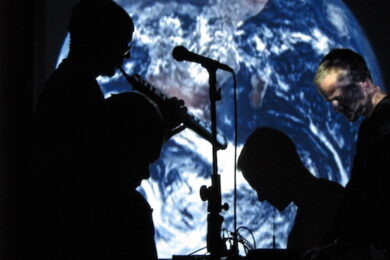Birds Of Disco Valley at Spirit Of Gravity
Were it not for the power of collective action, the Spirit Of Gravity, Brighton’s longest-running series of electronic and experimental music events, probably would have ended a long time ago. “If it was all down to one person, it would have died years ago,” Tony Rimbaud, one of its founders confirmed. “I mean, I drifted off for a couple of years, but it didn’t matter. Somebody else took it up. Because it’s a collective."
“I think,” he continues, “that’s one of the main reasons it’s kept going for 20 years. There’s always someone to pick up the slack.” Co-founder Nick Rilke agrees. “Organising events, putting posters up, writing press releases… it’s a pain in the arse. And, of course, if you collectivise, that’s shared.”
But it wasn’t just about the distribution of chores. “It was two-fold,” Rilke insists. “Brutal economic practicalities, and also: wouldn’t it be great to learn, share, participate. We had always liked collaborating – and the ultimate collaboration is a collective.”
For 20 years, the Spirit of Gravity has been a consistent source of weirdness on the Brighton music scene. From poky rooms in cafe basements, pub function rooms, and small theatres, strange and often astringent sounds from the likes of Ashtray Navigations, Max Tundra, Olivia Louvel, Metronomy, and Left Hand Cuts Off The Right (along with many others) have been alternately delighting and terrorising audiences within a context that has always felt laidback, welcoming, and convivial.
I remember my first encounter with the Spirit Of Gravity. It was via a poster on the wall of the Free Butt pub: simple black lettering photocopied onto A4 coloured paper, little different from countless other flyers stuck to the walls of the venue – except for that curiously iconic greyscale image of a falling man, reminiscent in style of the famous Tomb Of The Diver in Paestum.
The name itself, ‘Spirit of Gravity’, I recognised from the late works of Friedrich Nietzsche. “Come, let us kill the Spirit of Gravity,” he wrote from Rapallo on the Ligurian sea in 1882. For the German philologist, newly enamoured with Bizet and the ballet, this ‘Spirit’ represented everything opposed by the birdlike force of the dance. Here, I reasoned, must be a night for electronic music that you did not dance to, an evening dedicated to all that was heavy and earthy in experimental sonics. Talking to collective member Dan Powell just recently, he insisted the phrase had actually been chosen entirely at random from a volume that just happened to be in his jacket pocket one afternoon, drinking with Rilke and Rimbaud in the upstairs room of a central Brighton pub. But when I turned up to the actual gig itself nearly twenty years ago, what I found there both confirmed and confounded my expectations.
At the time, there were probably two main kinds of electronic music that I was broadly familiar with. There was the beat-forward, hoover synth-heavy, four-to-the-floor sound that had cluttered up charts and nightclubs alike for much of the 90s; then there was the academic electroacoustic composition I knew from university, often frighteningly austere and founded on obscure programmatic principles. But this was neither of those things. It was unruly, sometimes absurd (even a little daft), often very noisy, but also oddly playful, and touched by a kind of radical openness to instruments and influences from all over.
One minute an impenetrable wall of noise from Minimal Impact, the next braindance beats and sitar improvisations from Remote, downtempo BOC-ish synth grooves from Waxed Apple, skittering glitchy electronica by Multiplex, then ambient drones and dadaist poetry from Nick and Tony’s own duo, Malevich. “It was a very diverse thing,” recalls collective member Geoff Reader (aka DJ Cheesemaster) of the early days – but either despite that fact or because of it “there were people who would turn up regularly. Lots of milling around as people moved from the audience to the stage to get ready for their set.
“We liked that,” he concluded. “Liked the atmosphere.”

The Vainglories at Spirit Of Gravity
Asked to define that peculiar blend themselves, Spirit Of Gravity collective members are often hesitant – almost evasive. Geoff Reader has been looking after most of the booking for the series over the last few years and even he admits that “it’s still really ill-defined.” Rilke speaks in vague terms about artists being “like-minded”. Collective member Chris Cook (aka Remote, Hot Roddy, Same Actor) alludes to “a vague sense of adventure” before bracketing the question as “all very subjective”. Rimbaud is scarcely more exacting. “Obviously it’s electronic music,” he told me, “but there’s also the whole experimental angle – in all its different forms.” When further pushed, Reader speaks of artists “with something peculiar about them, someone with their own perspective on what they’re doing – on what is music, really.” In an essay for the Spirit Of Gravity website, published ten years ago at the end of the series’ first decade, Rimbaud called it “experiential music” (a coinage he credits to a typo), speaking of a kind of avant-garde synthesis in which “experience is paramount”.
Like many good ideas, the origins of the Spirit Of Gravity can be traced back to a psychiatric facility. Back in the early 90s, when Nick Rilke was still Nicholas McMaster and Tony Rimbaud was at least occasionally Anthony Gove, they were both employed by New Sussex Hospital on Windlesham Road in Hove, the former as a receptionist and the latter as a ward clerk. “It was much less business-like then than it is now,” Rilke recalls of his time working for the NHS, “and as used to happen a lot in hospitals then, quite a few people – including patients – would hang round reception and chat. So I got to know Tony through him stopping off at reception to chat.”
Rilke was then still pursuing an art practice started a few years earlier on the sculpture course at Brighton poly, while Rimbaud had a longer history in music: playing in punk bands, an ill-fated synth pop group, and for a while, an experimental tape loop-based duo with Robin Rimbaud (aka Scanner) as the Rimbaud Brothers. It wasn’t long before talk turned to some form of collaboration, an idea catalysed by an elaborate drinking game involving a full-colour homemade game board, elaborate movable pieces, and a lot of Polish vodka. They became Maphead, a “trans-media live art group”. For the best part of a decade, Maphead carried out spontaneous actions on the streets of Brighton: falling over each other in ill-fitting suits, ‘reverse begging’, and enacting grand openings – with ribbons, ceremonial scissors, and all – at the junction of ordinary pedestrian cul-de-sacs, all to the general bewilderment of unwitting passers-by. “But as time went on,” Rimbaud recalls, “I missed doing the music and I got a bit less interested in doing the other performance things. So I persuaded him to do Malevich.” Now they had a band, they just needed somewhere to play.
The first Spirit of Gravity gig took place on Wednesday 17 January 2001 at a venue called The Lift, above a pub near the station called The Pig In Paradise. The Lift was a curious sort of place with blackened walls and oak fittings. An old carpet sat strewn across the stage to stop any drummer’s kick drum from sliding about. It was run, at the time, by an artist and DJ named Jeffrey Louis-Reed (aka Disastronaut) who had founded Brighton’s arthouse cinematheque and would go on to create the UK Air Guitar Championships. The venue’s line-up was nothing if not eclectic. It had a capacity of little more than a hundred. Dan Powell, who played a set that night with a row of amplified wine glasses and electronic effects pedals, first on the bill, remembers an audience of “maybe twenty people?” A month later, The Strokes played their first UK headline set on the same stage. A month after that the venue was bought by a local “leisure company” named C-Side which owned some twenty-eight other venues, mostly big seaside clubs, across town. Before the end of the year, they would announce the venue’s closure.
Also on the bill that first night were the improvising trio Clarence Palmer, who Powell remembers very fondly (“loads of space and quiet bits”), and finally Malevich themselves. Malevich would continue to play at every Spirit of Gravity event for the first six months or so of its existence. They were effectively, as Rilke put it, the “house band”. After all, as Rimbaud told me, “the whole idea of it initially was for us to get gigs. That’s why we started it – and it kind of grew from there.”
Around that time, just after the turn of the millennium, the music scene in Brighton seemed to be in kind of an odd place. The town of Brighton officially became the city of Brighton & Hove just two weeks after the first Spirit Of Gravity show, on 31 January 2001. Property prices were rising sharply and a report that year identified Brighton as one of five “supercities for the future”. But the music scene continued to be dominated by the increasingly stale sound of 90s Britpop. And while chains like C-Side (and their rival Pleisure) were busy hoovering up all the venues, the business of putting on gigs was also increasingly consolidated in the hands of big promoters like Lout Promotions, who were based out of The Levellers’ Metway Studios in Kemptown and looked after most of the bigger local guitar bands, and Melting Vinyl, who tended to handle touring bands from Europe and America on labels like Drag City, Matador, and Thrill Jockey. But there was a sense that things were starting to change.
The beginning of the twenty-first century saw the start of an influx of increasingly strange music from the States (memorably dubbed by David Keenan in The Wire, “the New Weird America”) coming to Brighton under the auspices of Melting Vinyl. At the same time, local bands like Electrelane and The 80s Matchbox B-Line Disaster were busily picking rock music apart at the seams and reconstructing it from the ground up, into strange new forms. New artist-led collectives were forming in the city – and would continue to form over the course of the decade (like the noise and breakcore club night Wrong Music, or the improv-focused Safehouse). The Spirit of Gravity was both part of and apart from these developments. Perennial outsiders, being composed mostly of what Tony Rimbaud would describe to me as “bedroom artists” who didn’t need the infrastructure of rehearsal rooms and traditional musical instrument shops to make their music, most of the artists associated with Spirit Of Gravity were at a slight remove from any of the usual circuits or scenes. But in 2003, a little over two years after the first gig, the concert series founded by Nick Rilke and Tony Rimbaud became a collective of around a dozen musicians, sharing responsibilities, holding regular meetings, taking minutes, the whole kit and caboodle.

Concrete Belly at Spirit Of Gravity
Things changed for The Spirit Of Gravity with the founding of the collective. Malevich gave up their regular slot as “house band”, for one. Programming would now be decided by all the members together. Although very few who asked to play were ever turned down – and Chris Cook even told me that if he had ever did refuse any request for a gig, then he regrets it now – there remained, nonetheless, a certain hard-to-define coherence to Spirit Of Gravity events. That consistency was aided, no doubt, by the frequent presence of collective members themselves on the bill. Though Malevich were no longer playing every month, it was a good bet that either Remote or Waxed Apple or Minimal Impact or one of the other members probably would be. And having that regular space to play helped those artists develop their practice in various ways. Cook’s “huge load” of electronic gadgets and musical instruments (guitar, bass, dulcimer, sitar…) was gradually whittled down to just a laptop and the sitar – and his playing on the sitar became slowly sparser as he learnt “not to try and play it like a guitar”. Tony Rimbaud, similarly, credits the safe space provided by Spirit of Gravity gigs and the opportunities they provided for collaboration for the gradual developments of his own improvising chops as he played with more and more people, gradually learning to go beyond “just a bloody loud mess” towards something more nuanced, more spacious.
Collaboration has always been at the heart of the Spirit of Gravity, and though it was never an explicit part of the collective’s mission statement, just that process of meeting up regularly to talk and play together seems to have lent itself to it. As Rimbaud says, “Our raison d’être was to be a collective to make the Spirit of Gravity happen. That’s been the the prime reason. But spontaneously, all the time, if you go back through our gigs, there’s all these little duos.” Many of the collective members I spoke to recalled fond memories of spontaneous hook-ups with other members that would spring up for a while and then dissipate. At one point, Dan Powell decided to spend a whole year doing a different duo each month at every Spirit of Gravity event at the Caroline Of Brunswick pub. Then there were the bigger groups like the Spirit Of Gravity Quartet, the Spirit Of Gravity Fluxus Guitar Orchestra, a large group performance of Terry Riley’s minimalist classic In C… I think in a way these collaborations were probably more important than most of the members seem to realise. They created forms of organic solidarity between the different participants, forging communicative paths beyond words, embroiling each in the other’s soundworld.
Asked if any one particular memory springs immediately to mind from the last twenty years of Spirit Of Gravity gigs, numerous collective members brought up what we shall refer to as "the Riki Tik’s incident" – and not in a good way. Tucked into a North Lane street between a branch of Evolution and a shop selling high-end lingerie and scented candles, Riki Tik’s angular neon signage and low interior lighting seemed to signify an ambition to come over like some futuristic speakeasy in a dystopian manga film. What it actually was was a provider of ill-mixed 2-for-1 cocktails for the coked-up shirt and shoes crowd. “Quite why Brighton Live thought that the pre-Honey Club crowd would enjoy an early evening set of experimental music while they sank pints of Stella and practiced chat up lines is beyond me,” Dan Powell tells me.
Timed to coincide with the start of the university term, Brighton Live was a week-long free festival, spread across different venues throughout the centre of town, intended as a showcase for the city’s music scene. For some reason, the organisers decided to put the Spirit Of Gravity gig at Riki Tik. “We told them what our music was like,” Nick Rilke insists. “We made it very clear.” They were warned. Powell played first, and in the words of Tony Rimbaud’s blogpost about the event, “Let’s just say that the selection of abstract electro-acoustic experimentation didn’t go down that well with the locals.” As the night progressed, things, in Powell’s words, “got ugly”. It didn’t help that Rilke and Rimbaud’s own set had a few minor technical difficulties. Then the abrasive sheet noise of Minimal Impact pretty much wiped the floor. “If it wasn’t already empty,” Rilke recalls, “we cleared the place – and people were making quite rude comments.” Powell remembers the manager coming over to “have a word”.
But it wasn’t always like that. Amongst such trials, there were triumphs, too. Like the first all-dayer at the Free Butt in 2002, with Domino Records and Certificate 18 recording artist Pilote headlining and practically the whole collective on the bill, DJ Cheesemaster playing Raymond Scott tunes from Manhattan Research Inc. and Soothing Sounds For Baby in between acts. The place was full, packed. It was unprecedented. Or the gig at the Dome Studio Theatre for the venue’s Earsthetic programme of live interdisciplinary performance. “That,” Rilke remembers, “was just a really nice performance.” Or the long residency at the Komedia theatre, from 2009 to 2011. “We started getting bigger numbers of people coming down,” Reader recalls. “We had a proper sound engineer, decent PA and a whole new bunch of regulars.”
Well over 400 acts have graced the stages of the Spirit Of Gravity, at over a dozen different venues – several of which no longer exist. “I can’t get my head round the amount of acts and artists,” says Chris Cook. “So many names associated to some degree or another with the Spirit Of Gravity.” But as much – if not more – than the artists performing or the music being played, the story of the Spirit Of Gravity is about a collective of people who came together with a common purpose, and the increasingly diverse community of listeners that collective supports. That collective continues to grow, even if people drop in and out sometimes as work and family commitments get the better of them – and so does the audience, with new faces each month and a growing chorus of regulars. “That sort of thing developed over the twenty years,” Rimbaud says. “And that’s how it’s carried on.”
Having moved out of Brighton some years ago, it’s been a while since I last attended a Spirit Of Gravity show myself. But looking through the photos on the collective’s Twitter feed, there’s a lot that I immediately recognise: the same tangle of wires snaking across classroom-style tables; flickering animated images projected onto sheets hung from the walls, quotidian objects like scouring pads, fans, metal chains, possibly a banana marshalled into becoming instruments and more traditional instruments connected up into cybernetic systems of electronics and effects, Geoff’s over-sized ginger wig. Then there are other things in evidence in those pictures: the cheery bonhomie captured in a photo of four of the original collective members one night at the Caroline Of Brunswick. And reflected in a mirror at the back of a stage, behind an improvised performance by Gus Garside and Annie Kerr, we can catch sight of the audience, clumped cosily on chairs and tables, ears cocked, in rapt attention. The place looks full. They’ve come a long way since that cold Wednesday evening twenty years ago when twenty odd people turned up at The Lift club.
Spirit Of Gravity puts on shows, pandemic permitting, first Thursday of every month at the Rossi Bar, Brighton



